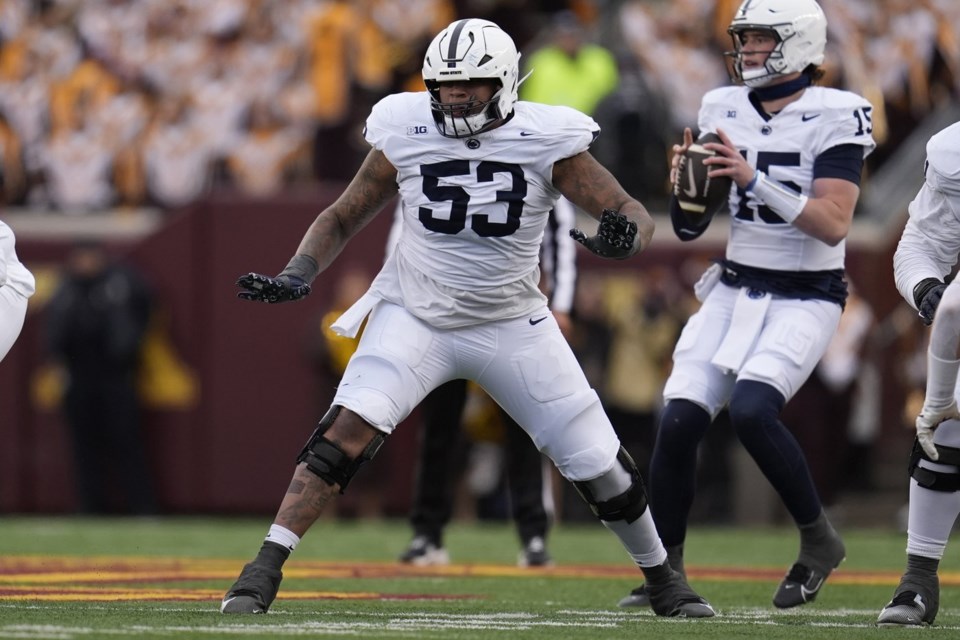WASHINGTON (AP) — President Donald Trump on Thursday signed an executive order mandating that federal authorities clarify whether college athletes can be considered employees of the schools they play for in an attempt to create clearer national standards in the NCAA’s name, image and likeness era.
Trump directed the secretary of labor and the National Labor Relations Board to clarify the status of collegiate athletes through guidance or rules “that will maximize the educational benefits and opportunities provided by higher education institutions through athletics.” The order does not provide or suggest specifics on the controversial topic of college athlete employment.
The move comes after months of speculation about whether Trump will establish a college sports commission to tackle some of the thorny issues facing what is now a multibillion-dollar industry. He instead issued an order intended to add some controls to “an out-of-control, rudderless system in which competing university donors engage in bidding wars for the best players, who can change teams each season.”
“Absent guardrails to stop the madness and ensure a reasonable, balanced use of resources across collegiate athletic programs that preserves their educational and developmental benefits, many college sports will soon cease to exist," Trump's order says. “It is common sense that college sports are not, and should not be, professional sports, and my administration will take action accordingly.”
There has been a dramatic increase in money flowing into and around college athletics and a sense of chaos. Key court victories won by athletes angry that they were barred for decades from earning income based on their celebrity and from sharing in the billions of revenue they helped generate have gutted the amateurism model long at the heart of college sports.
Facing a growing number of state laws undercutting its authority, the NCAA in July 2021 cleared the way for athletes to cash in with NIL deals with brands and sponsors — deals now worth millions. That came mere days after a 9-0 decision from the Supreme Court that found the NCAA cannot impose caps on education-related benefits schools provide to their athletes because such limits violate antitrust law.
The NCAA’s embrace of NIL deals set the stage for another massive change that took effect July 1: The ability of schools to begin paying millions of dollars to their own athletes, up to $20.5 million per school over the next year. The $2.8 billion House settlement shifts even more power to athletes, who have also won the ability to transfer from school to school without waiting to play.
At Big Ten Conference football media days in Las Vegas, Purdue coach Barry Odom was asked about the Trump order.
“We’ve gotten to the point where government is involved. Obviously, there’s belief it needs to be involved," he said. “We’ll get it all worked out. The game’s been around for a hundred years and it’s going to be around 100 more.”
The NCAA has been lobbying for several years for limited antitrust protection to keep some kind of control over this new landscape — and avoid more crippling lawsuits — but a handful of bills have gone nowhere in Congress. Trump's order makes no mention of that, nor does it refer to any of the current bills in Congress aimed at addressing issues in college sports.
NCAA President Charlie Baker and the nation's largest conferences both issued statements saying there is a clear need for federal legislation.
“The association appreciates the Trump administration’s focus on the life-changing opportunities college sports provides millions of young people and we look forward to working with student-athletes, a bipartisan coalition in Congress and the Trump administration,” said Baker, while the conferences said it was important to pass a law with national standards for athletes’ NIL rights as soon as possible.
The 1,100 universities that comprise the NCAA have insisted for decades that athletes are students who cannot be considered anything like a school employee. Still, some coaches have recently suggested collective bargaining as a potential solution to the chaos they see.
It is a complicated topic: Universities would become responsible for paying wages, benefits, and workers’ compensation and schools and conferences have insisted they will fight any such move in court. While private institutions fall under the National Labor Relations Board, public universities must follow labor laws that vary from state to state and it’s worth noting that virtually every state in the South has “right to work” laws that present challenges for unions.
Trump's order also:
— Calls for adding or at least preserving athletic scholarships and roster spots for non-revenue sports, which are those outside football and basketball. The House settlement allows for unlimited scholarships but does impose roster limits, leading to a complicated set of decisions for each program at each school that include potential concerns about Title IX equity rules. Trump said “opportunities for scholarships and collegiate athletic competition in women’s and non-revenue sports must be preserved and, where possible, expanded.”
— Asks the Justice Department and Federal Trade Commission to “preserve college athletics through litigation" and other actions to protect the rights and interests of athletes — a stance that could influence ongoing lawsuits filed by athletes over eligibility and other issues.
— Directs White House staff to work with the U.S. Olympic and Paralympic Committee to protect the collegiate pipeline feeding Team USA. College sports programs produce around three-quarters of U.S. Olympians at a typical Summer Games, but some are on uncertain footing as schools begin sharing revenue with athletes and the lion's share going to football and basketball.
___
AP National Writer Eddie Pells contributed.
___
AP college sports: https://apnews.com/hub/college-sports
Will Weissert, The Associated Press



